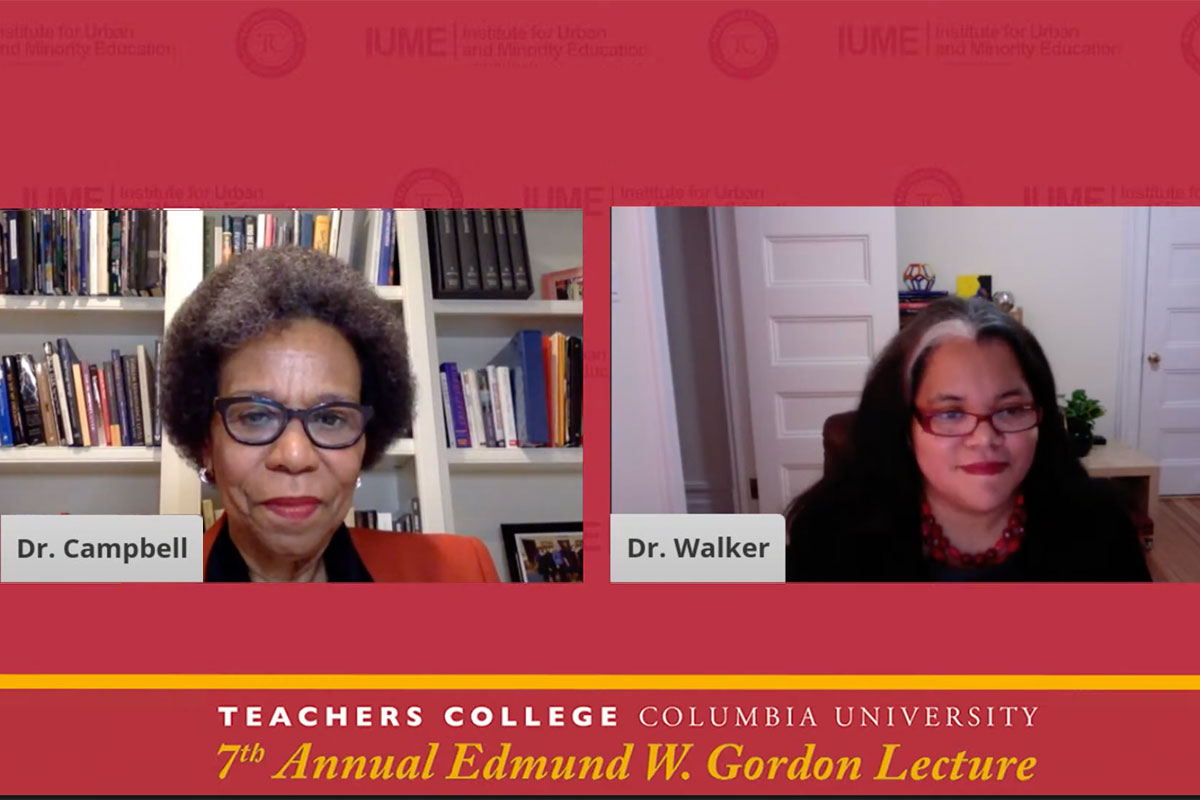In 2015, when Mary Schmidt Campbell became the 10th president of Atlanta’s Spelman College — a leading historically Black institution and the nation’s top producer of Black female scientists — she invited the principals of five neighborhood schools to dinner. She told them about all the great things that Spelman students were doing in schools throughout the city — leading chess clubs, glee clubs, STEM programs and more — and then asked each principal to name the single most important thing that Spelman could do for their school.
“As we went around the table, they all said the same thing — ‘teach our students to read,’” Campbell recalled this past week in delivering Teachers College’s seventh annual Edmund W. Gordon Lecture, titled “Students Teaching Students: The Untapped Power of American College Students.” “And I was stunned by that response. Because even in middle and high school, they were saying that deficiencies in reading were hobbling their students in other areas. And if that foundation of literacy isn’t there, then all of the other programs in the world are not going to be as effective as they could be.”
If that foundation of literacy isn’t there, then all of the other programs in the world are not going to be as effective as they could be.
— Mary Schmidt Campbell
For Campbell, the moment was “a mandate to do something” on multiple levels. At Spelman, the education department identified a literacy expert and put out a call for students who wanted to be trained in literacy instruction. More than 200 responded, and through an initiative called SpelREADS, they have since significantly boosted reading scores at participating schools, particularly in grades 3-5.
More broadly, through national platforms such as the Gordon Lecture, Campbell has been conveying her “growing sense of urgency” about “the state of K-12 education” and about why colleges and universities have “no choice” but to lead in “the involvement and improvement of urban education.”
Mary Schmidt Campbell, President of Spelman College, delivers TC’s seventh annual Edmund W. Gordon Lecture.
Over the next few decades, Campbell said, the country will undergo a “volcanic” technological revolution that will eliminate 80 million unskilled jobs. Yet even as nonwhite students become a majority on college campuses, the current six-year completion rates for Black and LatinX students at four-year institutions lag those for White and Asian students by as much as 25 percent, and Black students graduate with the highest level of debt. Meanwhile, despite research that demonstrates that higher income predicts attendance at elite colleges and universities, income inequity is more pronounced than it was 50 years ago and continues to increase.
“I challenge not only our institutions, but also students at our colleges who are motivated, to serve and to take responsibility for those students coming after them by holding out a hand to bring them along,” Campbell said.
I challenge not only our institutions, but also students at our colleges who are motivated, to serve and to take responsibility for those students coming after them by holding out a hand to bring them along.
— Mary Schmidt Campbell
While Campbell currently leads an institution known for its prowess in STEM and medical education, she is widely admired for her past leadership of arts institutions, and for her award-winning 2018 book An American Odyssey: The Life and Work of Romare Bearden (Oxford University Press). In a conversation that followed Campbell’s lecture, Erica N. Walker, TC’s Clifford Brewster Upton Professor of Mathematical Education and Director of its Institute for Urban and Minority Education (IUME), asked Campbell what Bearden and other artists could teach educators more fully harnessing the power of the arts.
“Science and technology need that sense of inventiveness, of taking risks,” that the arts provide, Campbell replied, while “the arts benefit from the knowledge and understanding of different disciplines that can inform its content, its processes, its way of working.” She added that Spelman is working to bring the two areas together by constructing a new Center for Innovation in the Arts.
The Gordon Lecture, sponsored by IUME, honors the legendary psychologist, IUME founder and TC Professor Emeritus Edmund W. Gordon, who was instrumental in the development of the federal Head Start program and the first Elementary & Secondary Education Act. In his introductory remarks, TC President Thomas Bailey hailed Gordon, 99, for continuing to champion “strategies for unleashing the talent and brilliance of disadvantaged young people of color.”
This year’s Gordon Lecture was presented in conjunction with HR100, TC’s commemoration of the 100th anniversary of the Harlem Renaissance. The next event in that celebration is “A Renaissance Education: Mildred Johnson Edwards and the Harlem School She Built,” focused on the late education reformer who, during the 1930s, founded The Modern School, a progressive, Black independent school that operated for more than 60 years in Harlem’s Sugar Hill. At the event, which will take place on Tuesday, December 8th, from 5:00-6:00 p.m., visiting faculty member Deidre B. Flowers (Ph.D. ’17), Assistant Professor and Interim Director of Africana Studies at Queens College, will present her research on Edwards.
